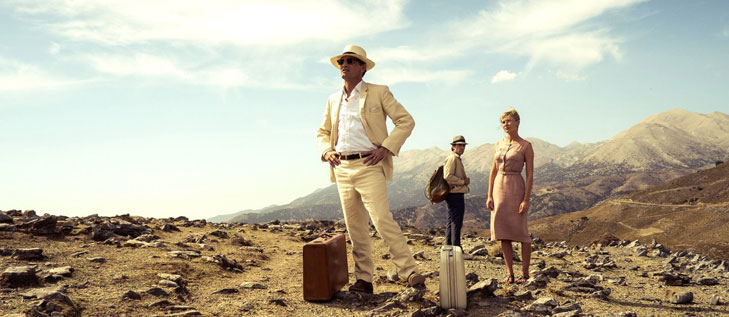Sexual jealousy, filial betrayal, and bloodshed amid a civilization’s ruins. The SF International Film Festival began on these cheerful notes, with Viggo Mortensen, Oscar Isaac, and Kirsten Dunst tensely keeping company in opening-night film The Two Faces of January, Hossein Amini’s adaptation of the 1964 Patricia Highsmith novel. Mortensen plays Chester MacFarland, a New York con artist who, having bilked investors out of large wads of cash back in the States, is on the lam in Greece with his pretty young wife, Colette (Dunst).
When they catch the eye of Rydal (Isaac), a fellow American who’s idling in Athens — leading impressionable female tourists around the Acropolis and engaging in petty acts of grift — he becomes entangled in their affairs through a volatile mix of chance and attraction. The three become uneasy travel companions, as Rydal helps them evade Chester’s enemies and the local authorities. The sexual tension between Colette and Rydal runs along a foreseeable track, their shared youthful resilience a relentless rebuke to Chester, as he grimly knocks back whiskeys and fails to keep pace. But as Amini — a first-time feature director whose screenplay credits include Snow White and the Huntsman, Drive, and The Wings of the Dove — pointed out during the post-film Q&A, the relationship between Rydal and Chester proves much more complicated and fluid, shifting repeatedly, unpredictably, from con and mark (and mark and con) to sexual competitors to unwilling collaborators to quasi–father and son. The suspense heightens and the drama deepens as the characters struggle to keep their emotional footing and save their skins.
There’s no saving Mia Wasikowska’s skin — scarlet and blistering under a punishing desert sun — in John Curran’s Tracks, another adaptation, whose source material is the 1980 memoir of a young woman named Robyn Davidson, Tracks: A Woman’s Solo Trek Across 1700 Miles of Australian Outback (and the 1978 National Geographic article that preceded it). In the film, Robyn’s single-minded aim is to walk, for six or seven months, across nearly 2,000 miles of desert from Alice Springs in central Australia to the Indian Ocean, with, for company, a team of four feral camels (Australia apparently has the world’s largest population of them), which she would tame and train and use as pack animals, and her black lab Diggity. There’s some Into the Wild here, and some All Is Lost as well — in Robyn’s driving impulse toward deep isolation, her almost frantic need to remove herself from the cacophony of human transaction and commune with her animals in the empty desert, as well as in the film’s steady focus on logistics.
Nearly everyone — with the loopy exception of Adam Driver as Rick Smolan, an admiring freelance photographer who periodically joins her on the trail, at the behest of National Geographic — Robyn encounters at the film’s outset thinks she’s nuts, and doomed, and the viewer is likely sympathetic to this viewpoint. Robyn, radiating an unyielding idealism and a white-knuckled ethic of self-reliance, can seem naïve and unreasonable, and doesn’t much trouble to explain herself. The camera, meanwhile, follows in her tracks without judgment, accepting her decision and watching, solicitously, to see who she is out there and how she will make her way.
Three other films that left a mark: James Ward Byrkit’s twisty Coherence is a sci-fi thriller in which the possible influences of a comet passing overhead disrupt the urbane table talk and relationship tensions among four couples at a dinner party. François Ozon’s latest film, Young & Beautiful (now in theaters after its fest debut) takes a 17-year-old girl’s summer-vacation sexual discoveries as a jumping-off point for an uneasy exploration of a teenager’s decision to engage in prostitution. Even more than Tracks’ protagonist, the young Isabelle (Marine Vacth), and the film itself, is tight-lipped about her motivations, leaving us to wonder and worry — and scan her household (voyeuristic little brother, possibly philandering mother, oddly laid-back stepfather) for clues, an activity that Ozon, through the structure of the film, both encourages and critiques. And fellow French director Sophie Fillières gives us scenes from a marriage in decline in her sometimes absurd yet poignant If You Don’t, I Will, wherein Pierre (Mathieu Amalric) and Pomme (Emmanuelle Devos) struggle to navigate the glitches — physical, verbal, emotional — that have overtaken their every interaction.
It’s not that the relationships in The Skeleton Twins are less riddled with dysfunction, but at least the film, starring Kristen Wiig, Bill Hader, and Luke Wilson, gives us permission to laugh out loud amid the psychic wreckage. Wiig plays the melancholy, quietly floundering Maggie, one half of a long-estranged pair of twins, who is brought back into the life of her brother, Milo (Hader), under dire circumstances. When he comes to live with Maggie and her husband, oblivious sweetheart and nature lover Lance (Wilson), the two siblings are placed in uncomfortable proximity to a history of loss and upheaval they’ve both worked hard not to reexamine.
This sounds like the difficult, even dismal material of familial drama, and there are moments of pathos here, as well as sweetness. But director Craig Johnson’s script, cowritten with Mark Heyman (Black Swan), gives Hader and Wiig — who showed up with Johnson to the fest’s first screening to answer a few questions in between stand-up riffing off of the audience — plenty of room to generate hilarity (see, in particular: a power ballad lip-synch routine and an after-hours dental office visit involving clouds of laughing gas).

